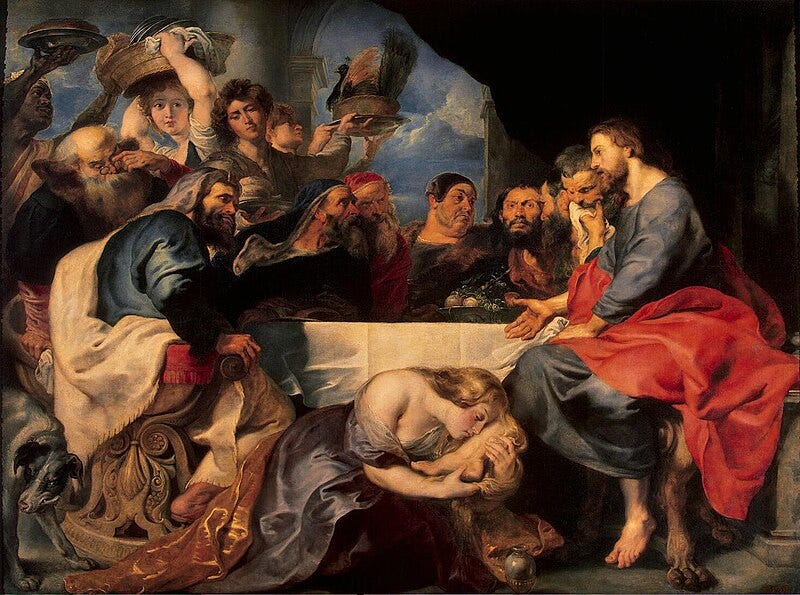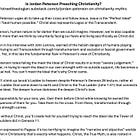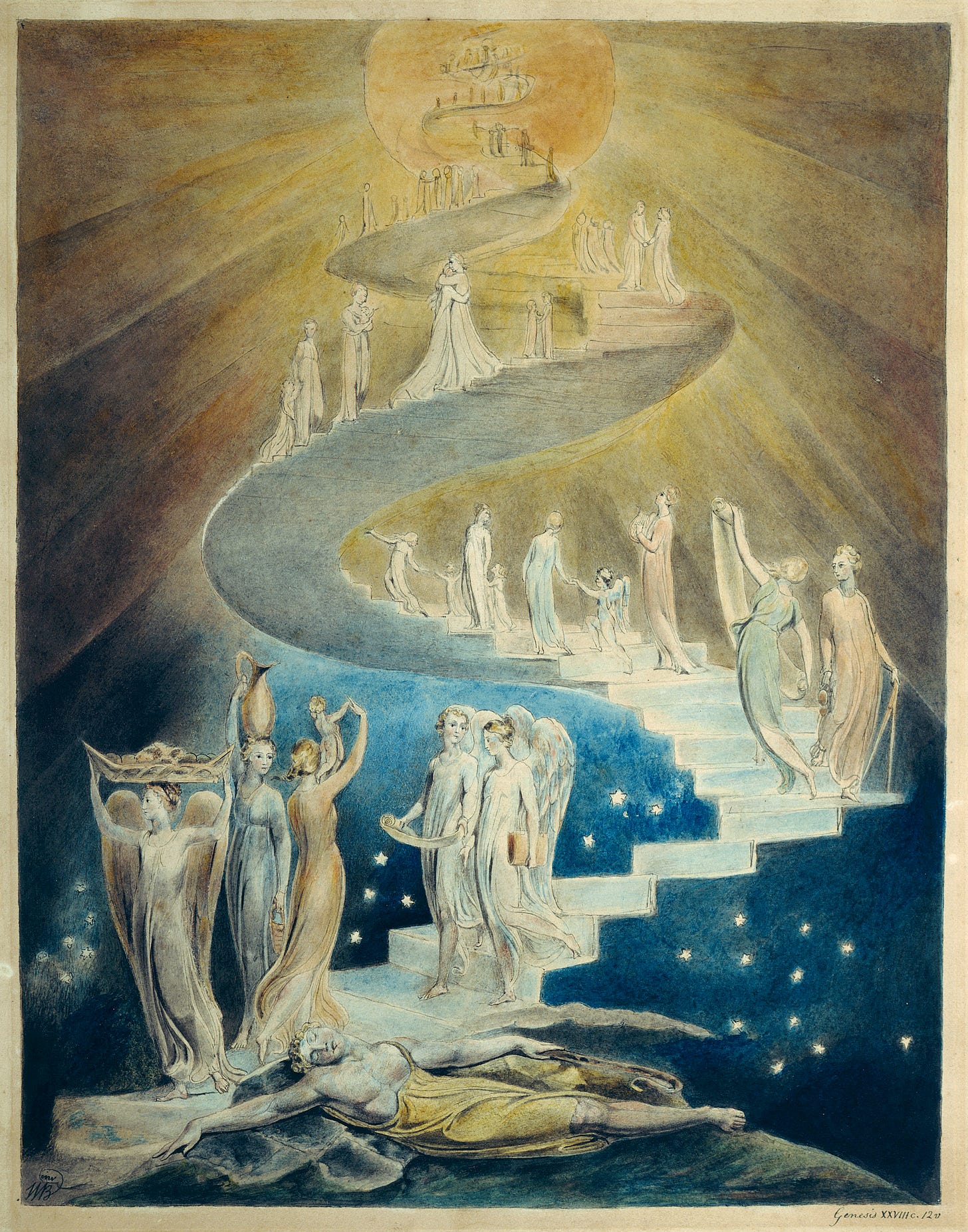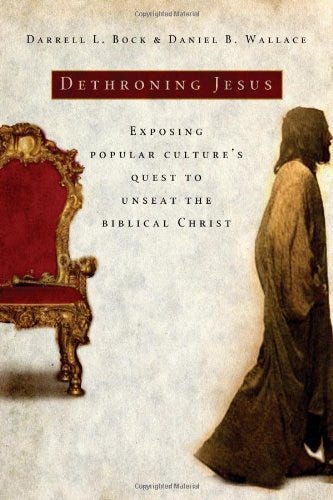Two GREAT MISCONCEPTIONS about Christianity
What sets Christianity apart. Who is Christianity for?
Find us on Medium.com
Or X
https://twitter.com/StreetTheologn
Or our brand new Insta:
instagram.com/streettheologianapologetics/
Two great misconceptions
There are two great misconceptions about Christianity (many more but let’s stick to 2 central ones today!).
Working your way to God?
On the one hand, many think Christianity is about working your way to God or being good to get into heaven.
Professing magic words?
On the other hand, some stereotype Christianity such that if you simply profess magic words you don’t mean with your heart, it doesn’t matter how you act and Jesus’ death will cover for your sins.
Jordan Peterson
Jordan Peterson, for example, has expressed this concern about the dangers of a mere verbal profession of faith in Christianity while elsewhere speaking of Jacob’s ladder as an indication that one should aim to climb one’s way to God. We address this here:
Both views are misguided. Both are major misconceptions about Christianity.
Can you work your way to God?
You cannot work your way to heaven. Trying to be good will not get you into heaven. We are all sinners. Our righteousness is filthy as rags (Is. 64:6). Our whole head sick (Is. 1:5-7). Just as a leopard cannot change its spots we cannot reach God’s standards in and of ourselves (Jer. 13:23). We have all fallen short of God’s glory (Rom. 3:23). We have created a divide we cannot bridge ourselves.
Christianity for the unworthy
Christianity is for the unworthy. For the fallen. For the broken.
Christianity is not about working your way to God. Rather, in Christianity, God came down to us through Jesus. Beaten. Bloodied. Tortured. Killed. Surrounded by evil. The Perfect suffered for the imperfect to make a way to God.
Jesus didn’t come for those who think they are righteous but for sinners (Luke 5:32). Jesus died for his enemies and urged his followers to pray for their enemies (Matt. 5:44).
Salvation as a free gift
As such, salvation is a free gift of God’s grace in Christianity (Rom. 6:23). Undeserved. Something we are incapable to achieve ourselves. Thus, we are called to put our faith in Jesus to accept this gift.
What we deserve in return for our efforts
Abraham’s faith was credited to him as righteousness (Rom. 4:3). This differs greatly from when someone works for a wage, expecting something due in return (Rom. 4:4). What is due to us is divine judgement, not salvation. Yet, Jesus took it on his shoulders for our sins (Gal. 3:13).
Grace through faith
We are saved by grace through faith, not of our own doing (Eph. 2:8). There are no grounds for boasting. No grounds for a moral performance narrative where we look down on others.
Our identity is based on Jesus’ work for us, not our own attempts at good works. It is what defines us. It shapes who we are.
Utterly dependant on God
We are utterly dependant on God for his goodness and grace. We are like lost sheep gone astray (Is. 53:6).
The prodigal son who frittered away his father’s estate on prostitutes and all other worldly pleasures is embraced by his father (Luke 15:20). He wasn’t worthy. He didn’t earn his father’s approval.
He in effect wished his father dead so he could take all his money.
Pharisee and tax collector
Jesus spoke more highly of the humble dependance on God of a realistic tax collector who beat his chest before God exclaiming what a sinner he was than of the pride of a delusional pious Pharisee who was grateful he was not like others (Luke 18:9-4) and boasted of all his good works.
Came to seek and save the lost
Jesus came to seek and save the lost (Luke 19:10). To give his life as a ransom for many (Matt. 20:28). To lay his life down for his sheep (John 10:11).
Sinful woman weeping at Jesus’ feet
Jesus’ grace saved a sinful woman of ill-repute and low social status (Luke 7:36-50) with Jesus telling her “Your faith has saved you (Luke 7:50)”.
She was weeping at Jesus’ feet, wiping his feet with her hair. At the same time, religious leaders who knew the Scriptures inside out wanted Jesus dead due to the wickedness in their heart and their inability to recognise they required a physician/ forgiveness (Mark 2:17, Matt. 9:12, Luke 5:31-32).

Upside down kingdom
Jesus provides the parable of the people who worked for the last hour getting paid the same as the labourers who worked all day (Matt. 20:1-16). The landowner representing God is generous and gracious to those who are undeserving (Matt. 20:15).
The last shall be first and the first will be last (Matt. 20:16). Christ’s kingdom is upside down. Those who humble themselves will be exalted those who exalt themselves will be humbled (Luke 18:14).
Grace
This points to the fact the kingdom of heaven is a kingdom of grace or undeserved favour being bestowed on people, not a place of entitlement and superiority.
Does this mean one can simply profess some magic words for Jesus to forgive them and then live as they wish?
No. Such a view complete misunderstands grace (Rom. 6:1-2). If you don’t see yourself as a sinner or feel sorry for your sin, grace means nothing. It’s not even grace. You’re playing word games.
To cheapen sin is to cheapen grace. There is an inextricable connection between the two.
To disregard all your sin as if there is nothing wrong with it is to disregard all grace God could give you for being saved from it. Period.
Jesus has an upside-down kingdom to what we expect. It goes against our human tendency for pride. We are freely given salvation. Nothing we do can earn it.
Love fuels works
This fills us with love and knowledge of acceptance, and makes us want to place more faith in Christ, making us to subsequently want to do good works.
Your friend smashes your car.. and some more…
If a friend says sorry for damaging your car and then proceeds to smash your window with ever greater intensity, did they say sorry in any heartfelt sense? They were merely lying. Playing games. They have no loyalty to you as a friend whatsoever.
Grace makes sense in a world where sin is wrong. If you are not sorry for your sin, you are not seeking grace for you don’t even believe you need any grace.
It’s like a sorry from a manipulative person who only wants you to close your mouth before they proceed to hurt you more.
Professing words that are distant from the heart’s state is not what one is called to in order to become a Christian. Words have meaning when accompanied by a state of sorrow for sin, a recognition that one needs Jesus. The prodigal son admitted his sin and how he did not deserve to be called a son (Luke 15:18-19).
Taking up one’s cross
Professing to follow Jesus is accompanied by denying oneself in taking up one’s cross (Mark 8:34). An admission, that under your own lordship, you directed your life away from God and that you need Christ’s forgiveness and lordship.
Repentance or a willingness to turn from your past is necessary (Luke 13:1-5). Yet, even repentance from sin (Acts 11:18) that comes with placing faith in Jesus is spoken of as a gift from God as is faith (Phil. 1:29). Grace shapes everything.
Works as fruits, not roots
Works are a fruit of faith in Jesus, not the root of the faith. After Paul says in Ephesians 2:8-9, we are saved by grace through faith, not of our own doing, so that no one may boast. He proceeds to say we are saved or created in Jesus for good works (Eph. 2:10).

Being saved fills us with love for Jesus. We love him because he first loved us (1 John 4:19). We seek to share his goodness and love out of gratitude for what he has done.
If you truly believe you have sinned against God, severed the relationship, and yet Jesus suffered an excruciating death for you that changes everything.
Faith alone- Does Paul contradict James?
This is why James says faith without works is dead (James 2:20). Works can point to or in a sense justify our salvation before others (James 2:24).
Fruit takes time to produce (Gal. 5:22-23) and the fruits of Christ’s goodness can take time to see in one’s life. James even says the testing of faith produces endurance (James 1:3), implying faith comes first. James even speaks of faith and confession leading to saving or forgiveness of sin in James 5:15-16.
Nonetheless, if no good works or fruits follow, the faith someone professed is not really faith at all.
There is no contradiction between the faith passages of Paul and the works passages of James.
As scholars Darrell Bock and Dan Wallace note in Dethroning Jesus, “James is asking about how justification looks by considering its product after time has passed, while Paul is asking what justification involves coming into it at the start. James is challenging the idea that a real claim of faith is real faith; he gives the demons as examples of beings who believe God is real yet who don’t believe in God in terms of having a relationship with him.”
The issue is what comes first
The issue is the order. We receive salvation by grace through faith and then works follow. In that sense we are saved by grace alone. However, no eventual works means no real faith to begin with.
Wandering
Sure, the path is often far from linear and Christians can sometimes fall into grievous sin (Rev. 2:20). We are often not in a position to determine the fruits of one’s life with clarity.
James even speaks of believers wandering yet being brought back to be saved from death with the repentance (an act of coming back) covering a multitude of sins (James 5:20). Christ remains faithful to his own even though we are often faithless (2 Tim 2:13).
At war with sin vs at peace with sin
The battle with sin will be lifelong. However, a crucial thing has changed- you are now at war with sin and not at peace with it (1 Peter 2:11). Ask God to empower you through his Spirit for transformation (Phil. 2:12-13).
We are called to work out our salvation yet also assured that God works in us to will and to do (Phil. 2:12-13). We are utterly dependant on God.
Paul, James, Peter, John and Jesus imply works or virtues proceed out of faith after we are saved (Rom. 6:1-2, 13:8-10, Gal. 5:13-25, James 2:14-26, 1 Peter 1:13-16, 2 Peter 1:5-11, 1 John 2:4-6, 4:7-21, Matthew 7:21-28, John 14:23-24, John 15:1-8).
Nonetheless, salvation is a free gift. We are saved by God’s grace. His work not our own. We are justified by faith apart from works of the law (Rom. 3:28) This then shapes, fuels and fills us with gratitude and good works follow. Abiding in Jesus is what produces fruit and apart from him we can do nothing (John 15:5). He is the one who cleanses us (John 15:3).
Saying I do with an immediate intent to cheat
To simply profess a few words without a desire for grace or Christ’s forgiveness is no profession at all. It is the equivalent to saying “I do” at a wedding ceremony and then pursuing someone in the crowd romantically the very next moment.
On the other hand, to think you can cleanse yourself or make your way to the divine through your own works is sheer self-delusion. Neither is true Christianity.
Come to Christ as you are
Come to Christ as you are. Your fallenness. Your dark, twisted, and evil thoughts and acts. Your wounded past. He promises to empower you. Ask Him to forgive you. To shape you. To cleanse you. We’re helpless on our own.
No grounds for boasting or a moral performance narrative
We have no grounds for thinking we are better or more superior than another (1 Cor. 4:7). Grace does for us what we could not do ourselves. Christ’s righteousness covers our filthy rags (Rom. 5:18, Is. 64:6).
Grace narrative changes all
Christianity is unlike any idea, religion, or worldview you will find anywhere. The grace narrative changes everything. The moral performance narrative is a path of pride, pain, delusion, and death. Will you create a never-ending rod for your back for the rest of your life or find true rest in Jesus who steps in to accomplish what you could not?
Find us on Medium.com
Or Twitter
https://twitter.com/StreetTheologn





















